A perceptive article by Rev. George Sinclair:
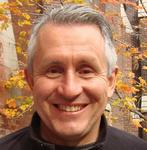 The Anglican Church of Canada (ACoC) was in the news last week. Most reports missed the big story. That the forces of biblical orthodoxy narrowly won a battle was correctly reported. What was missed was that those same forces lost the war. How they lost the war is significant for those of us in orthodox denominations.
The Anglican Church of Canada (ACoC) was in the news last week. Most reports missed the big story. That the forces of biblical orthodoxy narrowly won a battle was correctly reported. What was missed was that those same forces lost the war. How they lost the war is significant for those of us in orthodox denominations.
For a church to remain orthodox, it needs to change and develop. Keeping the status quo does not work. This sounds counter-intuitive but is true. Orthodox, biblical doctrine has to develop to meet new challenges that come against it. Most key developments in doctrine took place in the first few centuries of the Christian faith. New developments were required with the Reformation and its aftermath.
The last 50 years have seen new challenges to the Christian faith in the wake of massive cultural and intellectual changes connected to abortion, the sexual revolution, the LGBTQ+ movement, and very recently, the transgender juggernaut. At some point in time, a church, to remain orthodox, will have to clarify and/or add to its doctrinal statements to be clear about what the Gospel and the whole counsel of God clearly teach as being of first importance.
What would the FEB do?
I do not know what the specific doctrines of the Fellowship of Evangelical Baptist Churches (FEB) are, but let’s use them as an example. Imagine that over the next year several FEB churches and Pastors started to perform same-sex marriage ceremonies. I am sure that there would be calls to discipline those pastors and churches.
However, suppose the offending churches want to remain FEB, so they defend themselves against calls to be removed. The orthodox within FEB point out that the liberals have violated the doctrine of FEB. In their defence, the liberals say that to affirm something does not imply that something else is condemned or forbidden. They point out that the FEB rules/doctrines affirm monogamous heterosexual marriage, but the rules do not forbid other types of marriage.
The leadership of FEB replies that the exclusivity of heterosexual marriage has always been understood. The progressives reply to the effect, well, we now know things that people did not know before; now that same-sex marriage is legal in Canada, it is not the case that anyone reading the rules will assume that the rules forbid same-sex marriage; and, if you read the rules, they do not forbid same-sex marriage.
Now, let us be clear. This is not devious liberals finding a loophole. This is how thinking works, especially when there is a large, broad, powerful intellectual and cultural movement which now thinks differently than people did 50 years ago.
What could the FEB do? One thing is very clear, keeping the status quo will not work. If the FEB does nothing, then everyone can validly say that the FEB now allows same-sex marriages. In fact, if they do nothing, it will mean that they now accept the notion that different beliefs about marriage are valid, and are in fact just second or third-order issues, matters true Christians can disagree with each other over, like whether to sing hymns or praise songs.
We know that if this hypothetical situation ever developed, the FEB will deal with it as quickly as they can given their by-laws. Because they see themselves as being a biblically faithful, orthodox church, they will develop new denominational rules. They will amend their rules to make clear what the Bible and the Gospel teach and require, and it will clearly forbid what needed to be forbidden.
The FEB would view this as a first-order issue. After they had changed their rules/doctrine, they would go to those who dissent and call them to repentance and amendment of life, and if this, tragically, is refused, then I am sure the FEB would remove those churches and pastors who do not affirm the central, biblical, orthodox teaching on marriage and sexuality.
What the Anglican Church of Canada did
My FEB example makes clear what has really happened with the Anglican Church of Canada. The forces of orthodoxy in the ACoC won a battle, but the most important thing about that Synod is that it is now very clear that the “war” is over, they are no longer orthodox and cannot become orthodox.
First some background. The ACoC had its triennial General Synod July 10-16 in Vancouver. Let me translate this for non-Anglicans. A “Synod” is a duly called authoritative meeting of Bishops, clergy and laity that can make authoritative decisions. A “General Synod” is the national synod that can make decisions affecting the whole church. It happens every three years.
To change the national “Canons” (think by-laws on steroids), requires that the proposed change gets approved by a minimum two-thirds majority in each “house” in two successive synods. In other words, two thirds or more of all Bishops, clergy, and laity vote in favour of the change.
At their meeting in 2016, the General Synod of the ACoC passed changes to the Canons that removed the heterosexual language of the Marriage Canon. In 2019, an overwhelming majority of the laity and clergy voted for the changes. But in the house of Bishops, they came two votes shy of passing the two-thirds mark. So the change failed. By the way, the courage of those who argued for the biblical teaching on marriage should be noted and applauded.
In 2016 the Chancellor of the ACoC made clear that just because something is affirmed does not mean that alternatives are rejected. He pointed out that there is nothing in the current Canons that forbids same-sex marriage. He said the same thing this year.
The General Synod then overwhelmingly passed a series of affirmations which made clear that it agrees with the Chancellor’s ruling. Listen to this, “We affirm that, while there are different understandings of the existing Marriage Canon, those bishops and synods who have authorized liturgies for the blessing of a marriage between two people of the same sex understand that the existing Canon does not prohibit same-sex marriage.” The House of Bishops made a similar statement.
It gets worse. The Synod overwhelmingly passed “Affirmations” that say that both views on marriage are held “with prayerful integrity;” that all sides on this issue hold their convictions “in good faith” and that “we hold dear their continued presence in this church;” and that “we affirm our commitment to walk together and preserve communion.” In other words, different views on marriage are at best a third-order issue.
This means that biblical orthodoxy has lost the war. To make the Canons clearly biblical, the ACoC will have to change the Canons to add something to the effect that they reject same-sex marriage as biblical and that this is a first-order issue. This is not possible.
It is a little known fact that 85% of Canada lives in a Diocese (Anglican speak for “region”) that is in favour of same-sex marriage – and actively supports Gay Pride parades. Only 2.5% of Canadians live in a Diocese that has both affirmed that the Bible teaches monogamous heterosexual marriage and that it rejects same-sex marriage. There is no way for the 2.5% to get over two-thirds of the votes in each house for two consecutive synods.
What is more, if you go online and read the different resolutions that were passed, you will not see an orthodox church in action. They deleted a prayer from their official Prayer Book which involved praying for the conversion of Jewish people and replaced it with a prayer that could have been written by a Unitarian. They affirmed and encouraged the programmatic use of The Arusha Call to discipleship from the World Council of Churches. They expressed gratitude for the Muslim document “A Common Word Between Us and You; ”directed that it become a signatory to the document; and encouraged Christian-Muslim engagement to be based on the document.
I was not at this General Synod, but if it was at all like the ones I have attended as an observer, you would have also heard the Holy Spirit regularly referred to as “she,” and a very careful removal of all male pronouns for God. I could go on. For over 22 years I was an ordained minister in the ACoC. I could truly say that while their practice was often not orthodox, at the official level of doctrine they were orthodox, and I could affirm its doctrine in good conscience, and so remain. This option is clearly not available any longer for 97.5% of the ACoC, and maybe for all 100%.
The Bible is very clear. Jesus is very clear. All sexual knowing and stimulation are reserved for those in the holy estate of the matrimony between one man and one woman. All people outside of marriage are to live a celibate life. Sexual knowing and stimulation outside of the covenant of heterosexual marriage is sin. This is so deeply and clearly taught in the Bible, and so clearly taught that it is important on many levels, that it is a first-order issue. A church which says otherwise is not a biblically faithful, orthodox church.
Like this:
Like Loading...
Nicholls said she hoped that instead of trying to figure out why the church was in numerical decline, or get drawn into a “vortex of negativity” about it, Canadian Anglicans would instead focus on the church’s calling.


 From
From 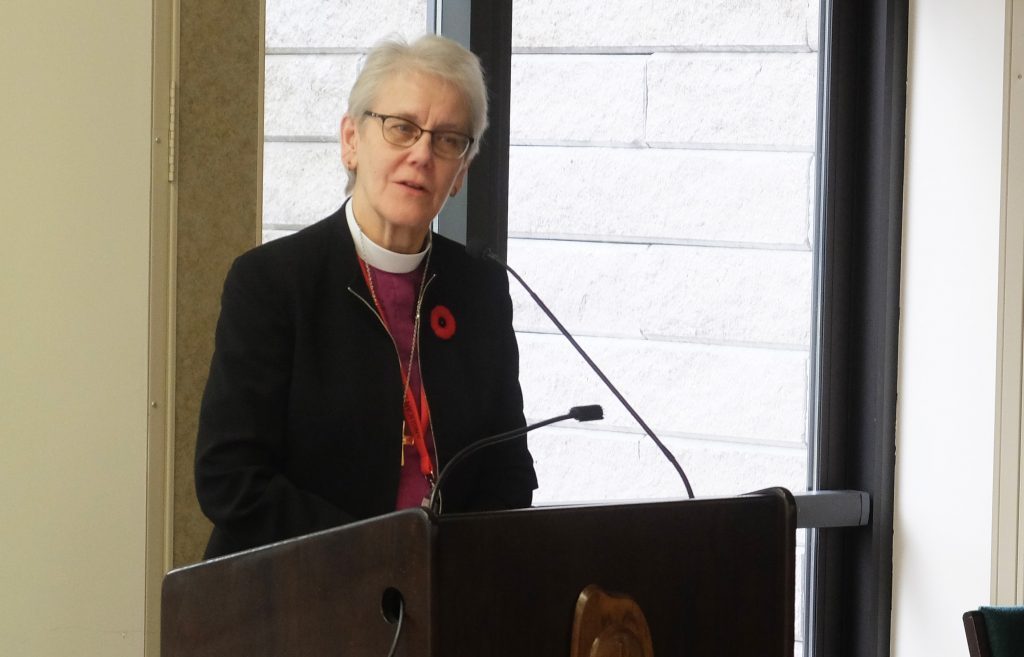



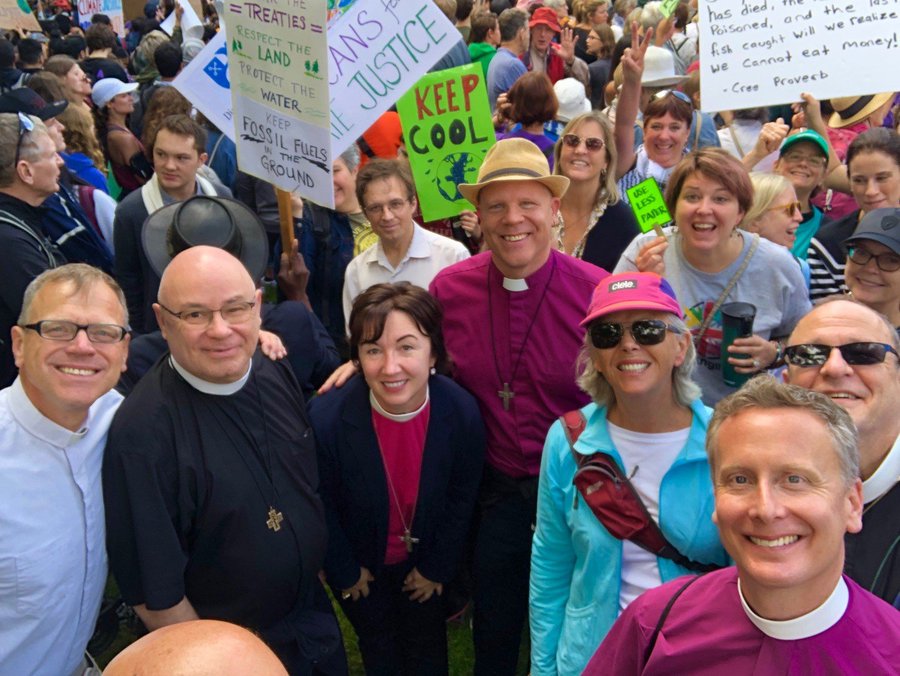 I may be wrong, but it seems to me that this was just a photo op for bishops to show off their new dentures.
I may be wrong, but it seems to me that this was just a photo op for bishops to show off their new dentures. Delegate to the United Nations Commission on the Status of Women – Expression of Interest
Delegate to the United Nations Commission on the Status of Women – Expression of Interest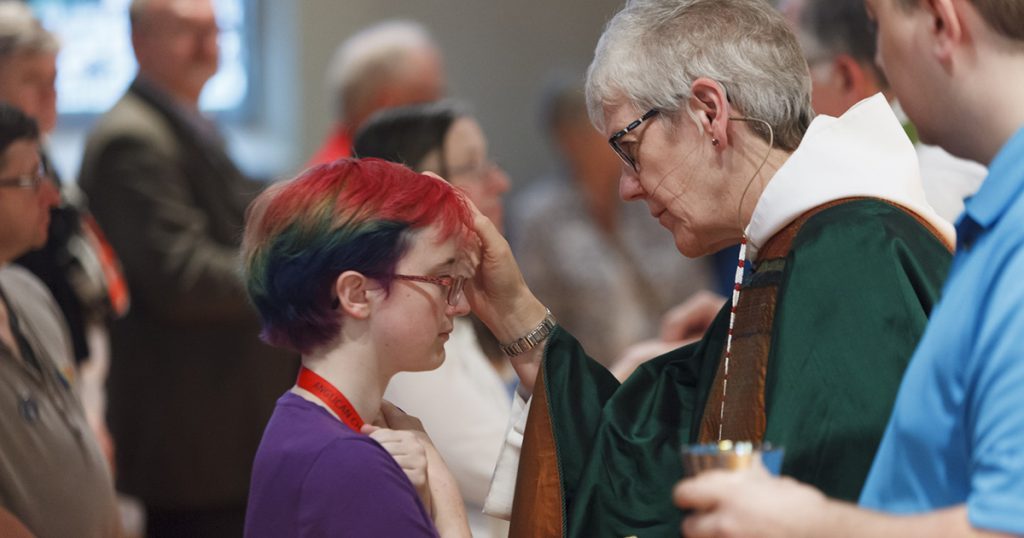 Marriage vote failure ripples through church
Marriage vote failure ripples through church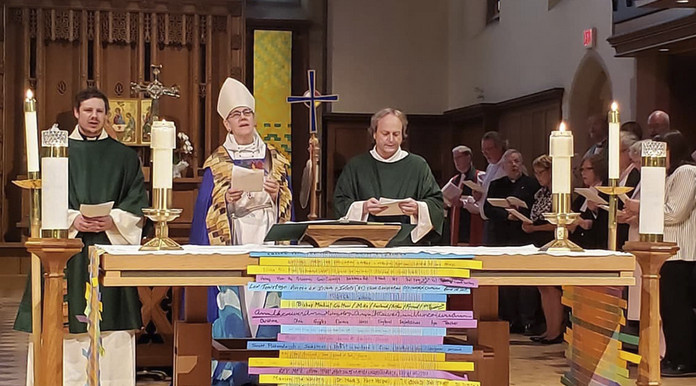 We have a unique opportunity to witness within the Anglican Communion to what it means to live together in faith. In a world of increasing polarization where differences become reasons to hate, we are a Church that gathers first around our call in Jesus Christ. We have differences – language, culture, race, sexual orientation, liturgical preferences, theological preferences – and we could divide on any or all of these. Yet, our beloved Church seeks a unity in God built on respect, dignity of every person, and the humility grounded in our need for each other as we each seek to be faithful to the Gospel and need to hear how God is speaking to each of us and to the whole Church. Despite the sometimes pain of our differences – we are family in Christ.
We have a unique opportunity to witness within the Anglican Communion to what it means to live together in faith. In a world of increasing polarization where differences become reasons to hate, we are a Church that gathers first around our call in Jesus Christ. We have differences – language, culture, race, sexual orientation, liturgical preferences, theological preferences – and we could divide on any or all of these. Yet, our beloved Church seeks a unity in God built on respect, dignity of every person, and the humility grounded in our need for each other as we each seek to be faithful to the Gospel and need to hear how God is speaking to each of us and to the whole Church. Despite the sometimes pain of our differences – we are family in Christ.
 The Anglican Church of Canada (ACoC) was in the news last week. Most reports missed the big story. That the forces of biblical orthodoxy narrowly won a battle was correctly reported. What was missed was that those same forces lost the war. How they lost the war is significant for those of us in orthodox denominations.
The Anglican Church of Canada (ACoC) was in the news last week. Most reports missed the big story. That the forces of biblical orthodoxy narrowly won a battle was correctly reported. What was missed was that those same forces lost the war. How they lost the war is significant for those of us in orthodox denominations.